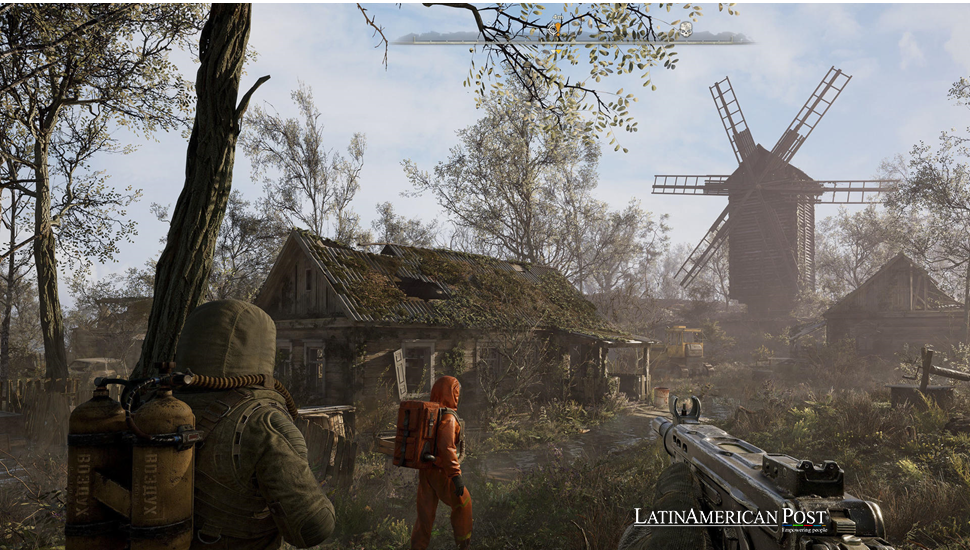Argentine Video Game’ Malvinas: The Last Letter’ Revives Falklands Story and Culture

Malvinas: The Last Letter, the first Argentine video game about the Falklands conflict, puts an Argentine twist on an international medium. More importantly, it pays homage to history and the national identity of gaming by focusing on veterans’ experiences.
New Chapter for Argentine Gaming and History
Malvinas: The Last Letter is re-emerging as a novel tribute to a significant moment in the history of Argentina, heralding a substantial leap for both Argentine games and cultural narrative. As the first Argentine game focusing on the 1982 Falklands conflict, this goes beyond the gameplay experience and seeks to put Argentina’s claim on the conflict at center stage. Drawing upon the real-life experiences of veterans, the project utilizes fictionalized storytelling to highlight how video games can be a tool for historical and cultural preservation and reflect the significance of preserving the voices of veterans. It transcended games; it symbolized the Argentinian experience and was eternalized in the people’s hearts.
In Malvinas: The Last Letter, developer El Burro Studio takes a narrative approach that should appeal to the average Argentine while piquing gamers’ interest abroad. The game chronicles the emotions, camaraderie, and hardships seen through the eyes of a fictional soldier, drawing from over a dozen hours of interviews with veterans. This storytelling device guarantees an honoring and emotional experience without straying from Argentina’s nationalistic pride in its past.
Video Gaming as Cultural Expression
We are seeing video games emerge as more robust platforms for telling complex stories about cultures. Malvinas: The Last Letter is a perfect case study of the evolution of that trend. Gamers in the present day want experiences that bring joy to us while also educating and motivating. In recent years, video games have become the medium through which nations tell their stories, particularly stories that would otherwise be less easily understood outside of the country that produced them. Thus, Malvinas: The Last Letter constitutes a cultural watershed, using the presence in the game to express points of view about the past. This educational aspect of the game is sure to leave players feeling informed and enlightened.
Based on a fictional consolidated role but deeply inspired by an actual principles-based witness, this game is where players can take a literally new step as soldiers tasked with preserving letters from other soldiers who died on battlefields. This original idea explores the wealth of potential of gaming as a pedagogical resource, igniting interest and awareness of an event that shaped Argentina’s bond with the Falklands, better known to them as the Malvinas. Hernán Patané has managed to create a relatable experience with his game. The emotional response to the narrative is more robust and wide-ranging because it is a fictional character guiding players through the story rather than just one person more narrowly recreating their experience. For many players, Malvinas: The Last Letter might be the first real experience with the Argentinian take on the conflict, evoking a sense of connection and empathy. Hence, this is a fantastic opportunity for cultural exchange.
Preserving the Argentine Experience in Language and Identity
Perhaps the most daring decision Patané and his team have made is that the game must preserve its Spanish dialogue and Argentine title, even if a publisher picks it up. It maintains the project’s national spirit, giving Malvinas: The Last Letter its voice as an Argentine work to the world without having to pander to English audiences. These are not negotiable details for Patané; they are part of the game’s authenticity and illustrate Argentina’s respect for its history and the narrative of sentiment around the Malvinas.
While there is always a chance of eventual localization, the creators have set such high conditions for any future publisher–retaining the name “Malvinas” and not dubbing the game in English, a rarity done in a game that seems insistent on staying grounded. This decision pays tribute to the veterans interviewed for the game. It reflects most Argentines’ national opinion regarding the need to preserve Argentinian rights over the islands. In an industry dominated by English-language content, the decision by Patané is an assertion that Argentina will not let the story be departed from, diluted, or sanitized.
Keeping over the tradition, filling great enthusiasm in new generations
The emotional burden of ‘Malvinas: The Last Letter’ could help prompt national pride and self-reflection in Argentinian youth beyond that of the initial emotional impact. Given the generation that Argentina is targeting with this acquisition, where screens and digital content have become highly relevant, it is an obvious next step to get their story into this space. Among them, video games are one of Argentina’s most intimate forms of entertainment, already a solid base for cultural dissemination. This videogame will be the first to tell a defining moment in Argentine history as it could be done by other media, a cultural mooring for new generations.
Malvinas: the last letter allows the easiest way to start a national conversation about memory, sovereignty, and identity that books or documentaries may not achieve. The game is an engaging way for Argentine youth, some of whom may only be familiar with the Malvinas conflict via school textbooks or family stories, to be introduced to the stories and emotions surrounding the historical event. Under Rivera, Patané and cohorts have straddled a generational, cultural gulf, using a modern medium to anchor an ancient fire—native pride.
On top of that, the story’s key themes—loyalty, courage, and sacrifice—are universal enough that they mean nothing but honor to people worldwide, and they’re deeply respectful of the Argentine people’s history and voice(s). Thus, Malvinas: The Last Letter serves a double purpose: it teaches those who look at the Falklands conflict from the viewpoint of the Argentine experience and, more importantly, reiterates the significance of knowing from the people who lived it. This emphasis on universal themes will make the audience feel connected and understood.
Progress for the Argentine Narrative in Games
Malvinas: The Last Letter expresses the evolution of Argentine gaming and an essential moment in the nation’s cultural history. It is also a testament to the power of diverse voices in the global gaming market, which has been saturated with English-language content and Western narratives — with the game being well-received overseas, particularly in Japan. Such an important story for millions of Argentines, Argentina’s narrative, and a critical section of it, in this case, the Falklands conflict, deserves its provincial place on the world stage. This game helps us to look into a story that will resonate with millions of Argentines.
It is a cultural win for Argentina and a glowing example of the games’ role in enabling diverse stories and voices. But the potential to inspire many thoughtful conversations and empathy from players worldwide is beyond just the Argentine community — which is why stories like Malvinas: The Last Letter deserve to be noticed. Patané is, rightly and importantly, maintaining this authentic version of the story, upholding the voices of Argentine veterans and their memories and honoring them without compromise.
Also read: Canada Needs a Latin America Strategy and Stop Ignoring Its Neighbors
With a fictionalized narrative still grounded in real-life experiences, Malvinas: The Last Letter can combine interactive storytelling with historical education in a mix that only gaming can achieve. With the correct publisher found (which Patané and El Burro Studio are currently pursuing), they are taking a piece of Argentina — its history, identity, pride, all — to a world that may not have yet fully understood the relationship that the South American country has with the Malvinas. This will be a solid entry in the pantheon of games and a lasting entry in the annals of Argentine storytelling.





